6+ Sample Scope of Work For Accounting Services
-
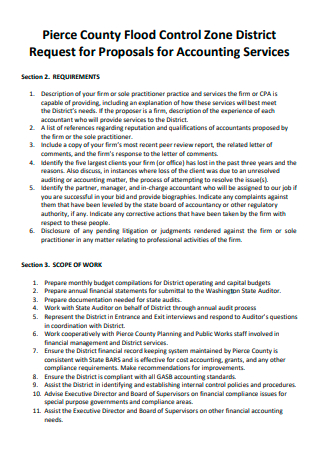
Scope of Work For Accounting Services Proposal
download now -
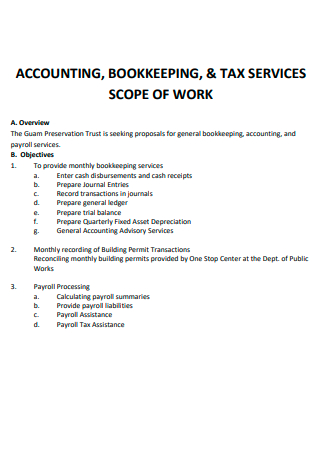
Basic Scope of Work For Accounting Services
download now -
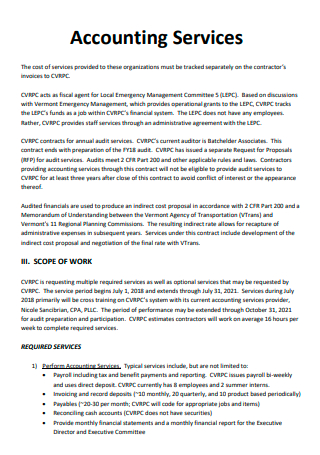
Scope of Work For Accounting Services Example
download now -
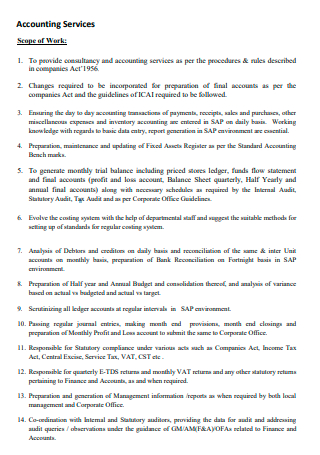
Printable Scope of Work For Accounting Services
download now -
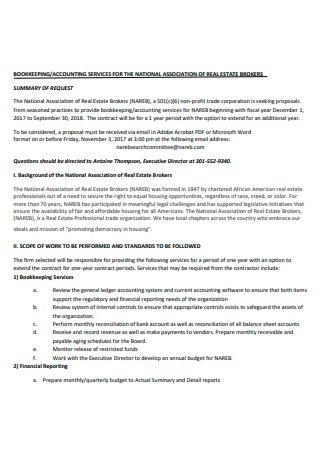
Scope of Work For Accounting Services in PDF
download now -
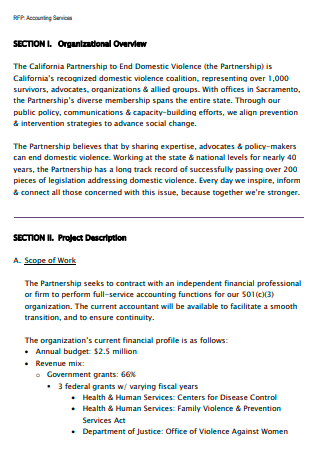
Standard Scope of Work For Accounting Services
download now -
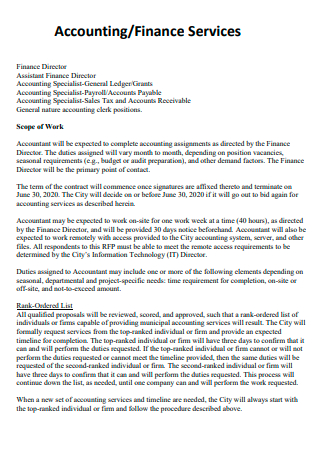
Scope of Work For Accounting Finance Services
download now
FREE Scope of Work for Accounting Services s to Download
6+ Sample Scope of Work For Accounting Services
What Is an Accounting Service?
Benefits of Accounting Services
Types of Accounting
How to Choose the Best Accounting Service for Your Business
FAQs
How many hours should bookkeeping for a client take?
Do bookkeepers do tax returns?
Is freelance bookkeeping profitable?
What Is an Accounting Service?
Accounting is a fundamental element of any company, regardless of its size. On the other hand, professional accounting services can assist business owners in making better decisions and investments by reducing errors and boosting efficiency. Small businesses require accounting services to keep accurate financial records, receive competent tax advice, and ensure submission with state and federal tax laws and other business regulations. According to statistics, sixty-seven percent of small businesses are satisfied with their accounting services.
Benefits of Accounting Services
Big companies, small businesses, and start-ups are all constantly moving, have moving finances, and need to keep track of every action. This way, decision-makers can increase productivity while saving money and resources without endangering the company. It is advised to work with an accounting services expert, whose job is to keep track of incomes and expenses, pay taxes on time, avoid unnecessary outgo, and many other things, to keep an eye on the entire company’s financial behavior. Let’s look more closely at the advantages of accounting services:
Types of Accounting
Accounting is an integral part of every community. If you are considering a career in accounting, you must know the various industry-specific accounting specializations. Accountants can specialize in multiple accounting subfields depending on their career interests and objectives. Here are the nine most common accounting methods:
1. Financial Accounting
Financial accounting is primarily concerned with compiling information for external financial reports. Financial accountants collaborate with coworkers and managers to devise profitable business strategies. In addition to ensuring that internal procedures are followed and that all financial activity appears on relevant financial statements, they monitor all economic activity recorded in a ledger. Financial accountants typically oversee or participate in general ledger accounting, accounts payable, accounts receivable, payroll, grant management, fixed assets, and work with revenues and expenditures. A financial accountant will be concerned with accurately recording and reporting previous financial transactions. Financial accountants are concerned with compliance and must adhere to the Generally Accepted Accounting Principles (GAAP) established for U.S. businesses and the International Financial Reporting Standards (IFRS) if a company operates internationally. Financial accountants must pay attention to detail to communicate the current economic state to external parties.
2. Managerial Accounting
This accounting record oversees and supports an organization’s financial plans. Instead of the general public, their documentation is typically intended for internal stakeholders. A managerial accountant must exercise caution when deciding whom to disclose sensitive information. To meet the demands of the organization’s short- and long-term goals, they collaborate with their managers to analyze and develop a budget. The purpose of managerial accountants is to forecast future performance by examining past performance.
3. Cost Accounting
Cost accounting can be viewed as a subset of managerial accounting, but the activities of cost accountants impact both financial and administrative accountants. Cost accountants are accountable for documenting, presenting, and analyzing the costs associated with manufacturing. They manage all variable and fixed costs to determine if a product’s output matches its production costs. In addition, they collaborate with managers to make future decisions based on the financial forecast and production progress. How unit costs are calculated can vary from industry to industry and even from business to business. Cost accountants are responsible for implementing, supervising, and providing feedback regarding tracking these costs. How to allocate overhead expenses is a significant concern. Direct materials and direct labor are straightforward to follow. Also, indirect costs, such as the cost of the machinery, building, utilities, shared staff, etc., can be allocated in various ways. Cost accountants can also be used to determine an employee’s actual cost. In the same way that indirect costs are allocated to products or services to establish a unit cost, department costs and overhead can be assigned to employees to determine how much it costs to employ them compared to how much they bring in. This can be used for employees whose roles generate revenue, such as sales staff or healthcare providers.
4. Auditing
In external auditing, a company submits its financial documents to a third party for economic feedback. In this situation, a third party is a reliable source for describing whether or not a company’s financial statement conforms to GAAP. In return, they provide feedback that can assist a business in becoming more profitable and effective. As this is an internal role, qualifications for internal auditors will vary. Certified Internal Auditor (CIA) certification is available to accountants, and some public companies and government agencies may require this certification for their internal auditors.
5. Accounting Information Systems
Accounting information systems, or AIS, is a company’s system for collecting, storing, and processing financial and accounting data. Numerous AIS are now designed to integrate with other departments, such as linking the Human Resources hiring process to the payroll function of a newly hired employee. This flow-through process reduces the amount of manual data entry. Professionals in AIS oversee the enhancement of effective accounting procedures. Employees in this field determine the optimal times to install updated technology and track the development of existing systems to determine if there is an increase in productivity over a given time. Together with the IT department, they can make decisions to ensure the continuity of technological processes. In addition, they frequently provide technical support for the upkeep of AIS, such as creating new accounts or resolving software errors.
6. Forensic Accounting
Financial records of individuals or businesses are investigated using forensic accounting. It may necessitate that accountants recreate financial data when some data is missing or unavailable for review. The purpose of forensic analysis is to collect all available documentation and account for all transactions in financial statements accurately and exhaustively. Frequently, these professionals are involved in cases involving fraud, claims, and disputes.
7. Public and Government Accounting
Public accounting refers to businesses that provide clients with customized accounting advice. They can audit, assist with tax returns, consult on procedures tailored to the installation of technology or computers, and offer legal counsel. In addition, government accountants oversee the financial planning and allocation of resources for local, state, and federal government departments. The Governmental Accounting Standards Board (GASB), responsible for developing consistent accounting procedures for local and state governments, has established standards for this type of accounting. The Federal Accounting Standards Advisory Board will be followed by federal workers (FASAB). Accountants in government will also oversee the budget and allocate funds appropriately.
How to Choose the Best Accounting Service for Your Business
Initially, many small business owners attempt to handle their accounting responsibilities. Still, there comes a time when it makes sense for every growing company to hire an accounting service to handle all financial obligations. You can then focus on developing your company, secure in the knowledge that a team of experts is available to provide the financial guidance and support you require. Because the best accounting service for your business will do much more than balance your books, this is the case. Additionally, they’ll serve as your trusted financial advisor, so you must find the best firm. Follow these seven steps to ensure your business hires the ideal accounting service.
Step 1: Define Your Needs
Before choosing the appropriate accounting service for your business, you must know your organization’s specific requirements. Consider your organization’s current and future accounting service requirements. What is the purpose of accounting services, and what will they bring to your business? Consider what role they will play in the development and expansion of your business—also seeking financial advice, budgeting, or assistance with setting financial goals. After establishing your business, you should hire an accounting service as soon as possible. Before making a final decision, it is essential to define your criteria, regardless of your business’s stage. The ideal service for you will fulfill all of your needs and those you did not even realize you had.
Step 2: Ask for Recommendations
Once you have chosen the accounting service you require, ask your contacts for referrals. This requires you to ask your family, friends, and coworkers which accounting firm they use and whether they would recommend it. Additionally, requesting referrals from business associates who operate in similar industries is beneficial. Often, word-of-mouth is one of the best ways to identify qualified candidates for your shortlist of accounting services. In addition, your industry’s trade association can be a helpful resource, and your business attorney may have a recommendation.
Step 3: Do Your Research
Even though some accounting firms may appear promising on paper, it’s crucial to conduct additional research before deciding. Asking company-specific questions about your objectives and whether they offer specialized services to support you may fall under this category. Additionally, it’s a good idea to ask their previous clients for references. Additionally, you ought to request a meeting with the employees who will be handling your account. Since you’ll interact with them frequently, they must speak for you and comprehend your needs. Make sure the company civilization suits you, and everyone agrees regarding communication, objectives, and needs. By doing this, you’ll contribute to preventing future potential issues.
Step 4: Align Your Business Specialties
One of the benefits of employing a skilled accounting service is that they are likely to specialize in multiple business areas. Thus, they can often provide a better, more specialized service to their diverse clientele. After all, an excellent accounting service will do much more than balance your books. In addition, they will monitor your cash flow, keep impeccable records to prepare you for the end of the fiscal year, and provide invaluable guidance throughout the process. But to do so, they must understand the specific needs of your business and the industry in which you operate. For instance, a retail tax accounting service may not be as compatible with a hair styling business as an accounting service that assists hair and beauty industry clients.
Step 5: Find out Their Fees
You don’t need an accountant to advise you that hiring the best firm you can afford makes good financial sense. Regarding accounting services, you get what you pay for, and trying to save money will only cost you more in the long run. Some accounting services have set rates for specific tasks, while others charge by the minute, which means you’ll pay for every time you talk to them. Make sure you know exactly how much your potential accounting service will charge for your business’s needs. It’s also helpful to gather out how much that will mean for you annually, considering tax returns or end-of-year reports. And once you agree on how much they will charge, make sure you get the deal in writing.
Step 6: Check Their Level of Service
Some accounting firms don’t have in-house bookkeepers so they will charge extra for their more expensive certified public accountants (CPAs) services. As a result, check what level of service the firm can provide based on their staffing if you want your accounting service to offer a full range of services at an affordable price. Bookkeeping, payroll processing, and income tax preparation should all be handled by seasoned, full-service accounting firms without the need for outsourcing or additional fees.
Step 7: Ensure Relevant Experience
One benefit of using an accounting service is that it can diversify due to its wide range of services and specialties. This frequently translates into more chances for them to gain knowledge and experience across various business models and industries. However, you must ensure that this breadth of expertise applies to you and your company. To ensure they can comprehend the needs of a small business in contrast to those of larger enterprises, they must have worked with clients who run businesses comparable to yours. Additionally, it is advantageous if they have prior experience working in the sector in which you operate, as this will enable them to be familiar with industry-specific rules and obligations.
FAQs
How many hours should bookkeeping for a client take?
On average, a client may require five hours per month, a medium client ten hours per month, and a large client twenty hours per month. You can then multiply these hours by the number of clients you need in each category to meet your income objectives.
Do bookkeepers do tax returns?
This is a task that your accountant can only perform. In addition, your bookkeeper will be incapable of filing corporate tax returns, calculating capital gains tax, and preparing management accounts, business plans, and cash flow projections. All of these tasks should be handled by an accountant.
Is freelance bookkeeping profitable?
Freelancing can be lucrative but more precarious because regular employment is not guaranteed. The income is inconsistent, as opposed to the steady paycheck provided by working for a single employer.
After completing your scope of work document, you should inform your client or stakeholder. Reach an agreement on the terms of your service provision. Ensure that the work you intend to perform is achievable and realistic. Don’t forget to discuss payment and when and how you will receive it. To begin creating your work scope, why not use our free templates as a starting point? Download them to get started!
